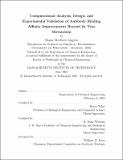Computational analysis, design, and experimental validation of antibody binding affinity improvements beyond in vivo maturation
Author(s)
Lippow, Shaun Matthew
DownloadFull printable version (3.577Mb)
Other Contributors
Massachusetts Institute of Technology. Dept. of Chemical Engineering.
Advisor
Bruce Tidor and K. Dane Wittrup.
Terms of use
Metadata
Show full item recordAbstract
This thesis presents novel methods for the analysis and design of high-affinity protein interactions using a combination of high-resolution structural data and physics-based molecular models. First, computational analysis was used to investigate the molecular basis for the affinity improvement of over 1000-fold of the fluorescein-binding antibody variant 4M5.3, engineered previously from the antibody 4-4-20 using directed evolution. Electrostatic calculations revealed mechanistic hypotheses for the role of four mutations in a portion of the improvement, subsequently validated by separate biochemical experiments. Next, methods were developed to computationally redesign protein interactions in order to rationally improve binding affinity. In the anti-lysozyme model antibody D1.3, modest binding improvements were achieved, with the results indicating potentially increased sucesss using predictions that emphasize electrostatics, as well as the need to address the over-prediction of large amino acids. New methods, taking advantage of the computed electrostatics of binding, yielded robust and significant improvements for both model and therapeutic antibodies. (cont.) The antibody D44.1 was improved 140-fold to 30 pM, and the FDA-approved antibody cetuximab (Erbitux) was improved 10-fold to 52 pM, with an experimental success rate of greater than 60% for single mutations designed to remove undersatisfied polar groups or improve misbalanced electrostatic interactions. Finally, a physics-based improvement to the calculation of the nonpolar component of solvation free energy was implemented and parameterized to address the over-prediction of large amino acids. These results demonstrate novel computational capabilities and indicate their applicability for enhancing and accelerating development of reagents and therapeutics.
Description
Thesis (Ph. D.)--Massachusetts Institute of Technology, Dept. of Chemical Engineering, 2007. This electronic version was submitted by the student author. The certified thesis is available in the Institute Archives and Special Collections. Includes bibliographical references (leaves 98-110).
Date issued
2007Department
Massachusetts Institute of Technology. Department of Chemical EngineeringPublisher
Massachusetts Institute of Technology
Keywords
Chemical Engineering.